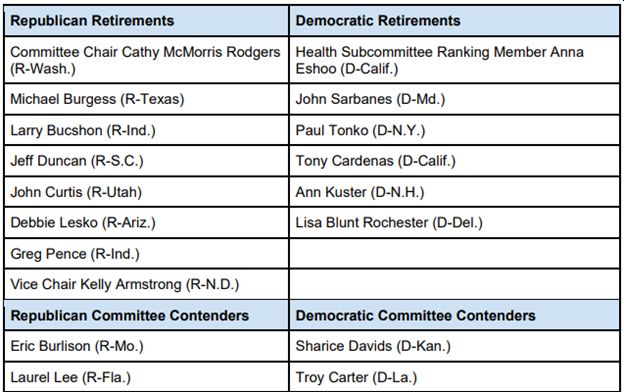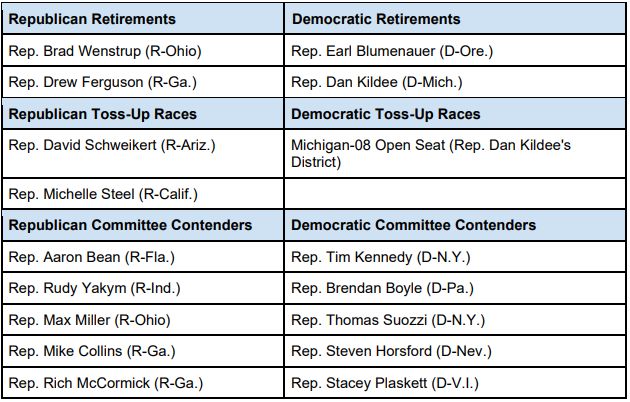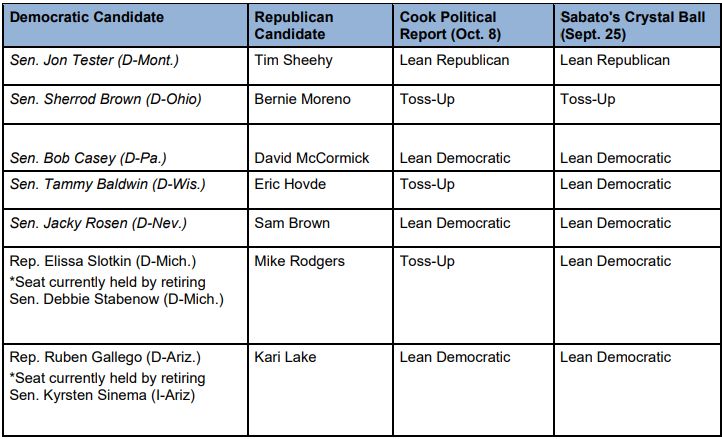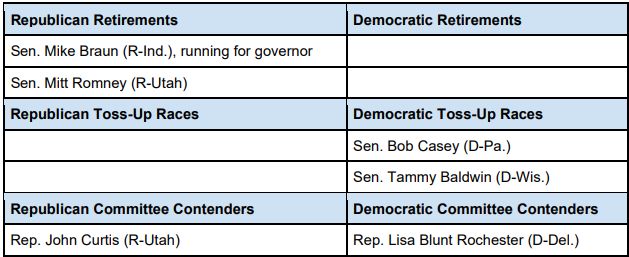- within Compliance topic(s)
Here is a special edition of Health Dose focusing on the congressional and administrative landscape as the November 2024 election approaches.
ELECTION WATCH
Election years inherently bring uncertainty and change, particularly in health policy, where priorities in both Congress and the executive branch can shift dramatically. The presidential race between Vice President Kamala Harris and former President Donald Trump is exceptionally close.
However, healthcare policy isn't determined solely by the occupant of the White House: Control of Congress plays an equally pivotal role. Currently, the House of Representatives is highly competitive, with Republicans needing at least 218 seats to maintain their majority and Democrats striving to net just four seats to reclaim control. Almost 30 races remain in the "toss-up" category, reflecting how uncertain the outcome is.
In the Senate, the margin is even slimmer. Democrats hold 51 seats, including three independents, while Republicans control 49. There are 34 Senate seats up for grabs, including a special election in Nebraska. Of these, 23 are currently held by Democrats or Independents. For Republicans to regain control, they need a net gain of two seats, or they could win the 2024 presidential election and gain just one additional seat. Whichever party wins control of the Senate will have a profound influence on the next president's legislative agenda, key appointments and judicial nominations. Of the 51 seats currently held by Democrats, only 14 are deemed solid. With several critical races on the horizon, both parties face a steep fight for dominance in Congress.
HOUSE OUTLOOK
House Leadership
The House of Representatives is up for grabs in the November election. Republicans currently hold power in the House with a slim majority of 220-211 and four vacant seats. All 435 seats are up for reelection in each Congress, and Cook Political Report places 26 of those races in the "toss-up" category. Neither party is definitively tracking toward the 218 seats needed to control the chamber. The conventional wisdom is that with House races so close and margins for control so tight, the House likely will follow whatever happens at the top of the ticket between Harris and Trump. Nevertheless, whichever party takes control of the House will undoubtedly do so by a slim majority.
House Republican politics will largely be dominated over the next several months by election results, Trump and the looming December funding fight. Speaker of the House Mike Johnson (R-La.) is seeking to retain control of the gavel during the 119th Congress; however, it could become an intraparty fight even if Republicans do remain in power. Johnson will need to grow the majority and handily retain control to remain Speaker or he will have to appease his critics to stay in his post. If margins are tight like they were this Congress, Speaker Johnson can only afford to lose a handful of votes in the Jan. 3, 2025, speakership vote. During his tenure as Speaker, after the ouster of Kevin McCarthy (R-Calif.) from the top leadership position, 11 conservatives have already attempted to unseat the Louisianan and other far-right conservatives have criticized the way he has handled appropriations battles and Ukraine aid. A broader group of conservative members have indicated they may push for Rep. Jim Jordan (R-Ohio) to take the helm, especially if Republicans lose the House. Jordan has positioned himself well for a shift to leadership, traveling, campaigning and raising money for a wide variety of House Republicans, even some that previously opposed his leadership attempts.
Although the House formally votes as a body on the Speaker at the start of the new Congress on Jan. 3, each respective conference will work through its leadership nominations immediately following the election. Should an intraparty battle emerge for the speakership, administrative items such as Committee leadership and Speaker-led new member appointments will take a back seat. The party in power will choose a Speaker-Elect before those items are addressed. Notably, the Speaker-Elect position only requires a simple majority of the conference via a secret ballot. The Jan. 3 vote is tighter – the Speaker-Elect needs at least 218 votes and near-unanimous party backing, leaving little room for defections in a tight majority.
Should Johnson decide not to run for Speaker, or if Republicans perform poorly in the general election, Jordan and Majority Leader Steve Scalise (R-La.) would likely emerge as frontrunners to take on his role as party head. Majority Whip Tom Emmer (R-Minn.) and Chief Deputy Whip Guy Reschenthaler (R-Pa.) might also stay in their respective roles. However, Reschenthaler may be eying up a leadership role on the Rules Committee with Rep. Tom Cole (R-Okla.) heading up the Appropriations Committee, which would leave an opening within the leadership lineup.
House Democratic leadership is expected to be much more static; Minority Leader Hakeem Jeffries (D-N.Y.) and Minority Whip Katherine Clark (D-Mass.) both plan to remain in their leadership positions. Earlier in the year, Assistant Leader James Clyburn (D-S.C.) stepped down from his leadership role and was replaced by Democratic Policy and Communications Committee Chair Joe Neguse (D-Colo.).
Energy and Commerce Committee
The 119th Congress will yield a shakeup in the House Energy and Commerce Committee. Current Energy and Commerce Chair Cathy McMorris Rodgers (R-Wash.) is retiring, and Reps. Brett Guthrie (R-Ky.) and Bob Latta (R-Ohio) are both running to become the lead Republican for the Committee. Guthrie currently serves as the Chair of the Health Subcommittee, so if he is promoted to Chair/Ranking Member, there will be a new Subcommittee Chair. Reps. Buddy Carter (R-Ga.), Morgan Griffith (R-Va.) and Gus Bilirakis (R-Fla.) are possible contenders for that role should it open up. Rep. Richard Hudson (R-N.C.), who currently chairs the National Republican Congressional Committee, could also throw his hat in the ring for Chair/Ranking Member depending on if Republicans keep their majority.
On the Democratic side, Ranking Member Frank Pallone (D-N.J.) will likely continue as the Committee's top Democrat. Rep. Anna Eshoo (D-Conn.), the Health Subcommittee Ranking Member, is retiring this Congress and Rep. Diana DeGette (D-Colo.) is the most likely contender to take on her role. Steering Committees for each party will determine topline leaders, and Subcommittee Chair and Ranking
Member appointments will almost immediately trickle down. Typically, the Steering Committee will review all Committee leadership assignments before turning to general membership decisions.
The current ratio on the Committee is 29 Republicans to 23 Democrats. Regardless of whether the House flips or remains under Republican control, the ratios are likely to be similar due to tight margins. However, the ratios are negotiated by leadership and are subject to fluctuation. Should the House flip, there likely will not be many new Republicans welcomed onto the Committee, but few members will likely be kicked off given the number of retirements this Congress.


Ways and Means Committee
Unlike Energy and Commerce, Ways and Means will look substantially similar to how it looks now. 118th Congress Ways and Means Chair Jason Smith (R-Mo.) and Ranking Member Richie Neal (D-Mass.) will likely remain as the committee's leadership. There likely will not be changes to Ways and Means Health Subcommittee leadership – Reps. Vern Buchanan (R-Fla.) and Lloyd Doggett (D-Texas).
The current ratio on Committee is 25 Republicans to 18 Democrats. The ratio could change if Democrats take the House, but we generally expect it to be similar in the 119th Congress.

Tri-Caucus Transitions
- Congressional Black Caucus (CBC): There are several contenders for CBC chair, including Reps. Troy Carter (D-La.), Steven Horsford (D-Nev.), and Yvette Clarke (D-N.Y.). Horsford is the current CBC chair.
- Congressional Hispanic Caucus (CHC): CHC Deputy Chair Adriano Espaillat (D-N.Y.) is favored to succeed current Chair Nanette Barragán (D-Calif.).
- Congressional Asian Pacific American Caucus (CAPAC): Current Vice Chair Grace Meng (D-N.Y.) is favored to succeed current Chair Judy Chu (D-Calif.).
Party Politics
- New Democrat Coalition: Reps. Sharice Davids (D-Kan.) and Brad Schneider (D-Calif.) are vying to take over the New Democrats, the socially liberal, fiscally moderate caucus ideologically positioned between the Congressional Progressive Caucus and the Blue Dog Coalition.
- Congressional Progressive Caucus (CPC): Rep. Greg Casar (D-Texas), who currently serves as whip on the CPC, is expected to take over from the current chair, Rep. Pramila Jayapal (D-Wash.).
- Blue Dog Coalition: The Blue Dog Coalition is co-chaired by Reps. Jared Golden (D-Maine), Mary Peltola (D-Alaska), and Marie Gluesenkamp Perez (D-Wash.). Rep. Golden is in a tight race to retain his seat in Congress. He has previously described ambitious plans to revamp the Blue Dog coalition if Democrats take the House, resituating the caucus as a venerable centrist voting bloc that holds the power to dictate the outcome of legislation on top priorities.
- Freedom Caucus: Rep. Andy Harris (R-Md.) was elected as the incoming Freedom Caucus chair for the upcoming Congress. Interestingly, Harris also serves as an Appropriations subcommittee chairman, or "cardinal," and he has emphasized that he will use his understanding of the appropriations process to push for the most conservative spending outcomes possible. Harris succeeds Rep. Bob Good (R-Va.), who lost his primary to John McGuire and left Congress before the end of his term.
- Republican Study Committee (RSC): Rep. Kevin Hern (R-Okla.) is running for reelection as RSC chair.
SENATE OUTLOOK
The Democratic Party currently holds a slim majority in the Senate, with the balance of power currently standing at 51-49 (including the three Independents who caucus with the Democrats).
It is unlikely either party will garner a 60-seat, filibuster-proof majority in the Senate. Still, the map this fall heavily favors Senate Republicans: of the 34 seats up for reelection, 23 seats are Democratic-held and only 11 seats are Republican-held. This means that Republicans will only need to flip two Senate seats to gain control of the chamber. Since the seat currently held by retiring Sen. Joe Manchin (I-W.Va.) will almost certainly go to the Republican candidate running to replace him (West Virginia Gov. Jim Justice), the best-case scenario for Democrats will likely be a 50-50 split. Should Kamala Harris win the presidential election, Democrats would have a razor-thin majority. With a Donald Trump victory, Republicans would flip the chamber.
The table below provides an overview of Senate races to watch. Each of these seats are currently held by Democrats. Absent a darkhorse upset, if any of these seats flip, the chamber will flip.

Italics: candidate is the incumbent.
*Incumbent is retiring or seeking other office
The most plausible – yet far from likely – potential pickup for Democrats in the Senate is the seat currently held by Sen. Ted Cruz (R-Texas). Other long-shot potential pickups include the seats currently held by Sen. Deb Fisher (R-Neb.) and Sen. Rick Scott (R-Fla.).
Senate Leadership
Sen. Mitch McConnell (R-Ky.) is stepping down as Senate Republican leader. Senate Republican Conference Chair John Barrasso (R-Wyo.) has not yet publicly announced a date for the leadership election, but it is tentatively scheduled for Nov. 13. Sens. John Thune (R-S.D.) and John Cornyn (R-Texas) are currently the frontrunners in the Senate Republican leadership race. Scott is also in the running, and should Republicans win the White House, it is possible that his candidacy will see a surge in support. A Republican victory in the presidential race might also spur Sen. Steve Daines (D-Mont.) to launch a late campaign for the position. Additionally, if former President Trump wins and chooses to speak out, he could potentially influence the overall leadership process.
The No. 3 GOP spot, Senate Republican Conference chair, has two people running: Sens. Joni Ernst (R-Iowa) and Tom Cotton (R-Ark.).
As in the House, there is much less uncertainty expected on the Democratic side. Sen. Chuck Schumer (D-N.Y.) is expected to remain in his leadership role.
Senate HELP Committee
Senate Committee sizes, assignments and ratios will partially depend on specific election outcomes, Senate control and the balance of power.
Current HELP Chair Bernie Sanders (I-Vt.) has indicated he is "interested" in pursuing a seat on the Senate Finance Committee. He would not necessarily need to give up his leadership role on HELP to do so, but should he step down, Sen. Bob Casey (D-Pa.), Sen. Tammy Baldwin (D-Wis.) or Sen. Chris Murphy (D-Conn.) would likely take his place.
Current Ranking Member Bill Cassidy (R-La.) is expected to retain his leadership position on the HELP committee. Sen. Rand Paul (D-Ky.) will likely again decline to take the top Republican role on HELP in favor of heading up the Senate Homeland Security and Governmental Affairs Committee (HSGAC) – especially if Kamala Harris wins the election, considering the committee's subpoena authorities. Another potential change-up could occur if Sen. Mitch McConnell (R-Ky.) decides to bump Sen. Susan Collins (R-Maine) from her position on the Senate Appropriations Committee. Sen. Collins might elect to take the helm on HELP in that scenario.
Several slots are likely to open up "down dais" on the Republican side of Senate Finance. Sens. Mike Braun (R-Ind.) and Mitt Romney (R-Utah) are not returning (Sen. Braun is running for governor, and Sen. Romney is retiring), and the two freshman Republican senators currently serving on HELP – Sens. Markwayne Mullin (R-Okla.) and Sen. Ted Budd (R-N.C.) – may opt to give up their HELP seats.

To view the full article click here.
The content of this article is intended to provide a general guide to the subject matter. Specialist advice should be sought about your specific circumstances.




